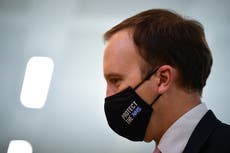Most vulnerable should get Covid vaccine by Easter unless government ‘screws up distribution’, says government adviser
‘I’m quite optimistic of getting enough vaccinations done in the first quarter of next year that by spring things will start to look much more normal than they do now,’ says Sir John Bell
Your support helps us to tell the story
From reproductive rights to climate change to Big Tech, The Independent is on the ground when the story is developing. Whether it's investigating the financials of Elon Musk's pro-Trump PAC or producing our latest documentary, 'The A Word', which shines a light on the American women fighting for reproductive rights, we know how important it is to parse out the facts from the messaging.
At such a critical moment in US history, we need reporters on the ground. Your donation allows us to keep sending journalists to speak to both sides of the story.
The Independent is trusted by Americans across the entire political spectrum. And unlike many other quality news outlets, we choose not to lock Americans out of our reporting and analysis with paywalls. We believe quality journalism should be available to everyone, paid for by those who can afford it.
Your support makes all the difference.The most vulnerable people in the UK population should be vaccinated by Easter, unless authorities “screw up" the nationwide distribution of doses, a scientific advisor to No 10 has said.
Sir John Bell, a member of the government’s Scientific Advisory Group for Emergencies (Sage), said there was a "70 to 80 per cent chance" that coverage of the elderly and other at-risk groups could be achieved by spring.
“That's provided they don't screw up the distribution of the vaccine,” Sir John told a health and social care committee on Tuesday.
Sir John, who is also regius professor of medicine at Oxford University, was asked by MPs to explain his optimistic assessment.
He said that the high efficacy rate of the Pfizer vaccine, which is still being tested on volunteers and has yet to be approved, indicated that other candidates in development would also work in preventing Covid-19 among infected individuals.
“There are some more things we need to do,” he said. "We've got to get regulatory approval, we've got to get more material manufactured, have to get it distributed. It'll be hard to distribute as it has to be distributed at -80C, which will be complicated.
"But it also signals that many of the other vaccines that are at the same immunogenicity are likely also to be efficacious. I wouldn’t be surprised if we hit the New Year with two or three vaccines, all of which could be distributed.
“That's why I’m quite optimistic of getting enough vaccinations done in the first quarter of next year that by spring things will start to look much more normal than they do now.”
Pfizer and its German partner BioNTrech announced yesterday that their coronavirus vaccine appears to be 90 per cent effective, pending further analysis and regulatory assessment.
Sir John hailed the development as a “massive step forward” in the fight against Covid-19, saying it was never a given that a successful vaccine would be produced.
“I think this journey to a vaccine has been a long journey,” he said. "I think there's a risk that people will underestimate the importance of the announcement made yesterday — and that is the big challenge here was to find a vaccine that actually had efficacy against this virus.
“There are many pathogens for which we have looked for decades and not found a vaccine that works. Malaria we haven’t got a vaccine, HIV we haven’t got a vaccine. I think everyone has taken it as a given somebody will produce a vaccine — not true.”
The UK government has ordered 40 million doses of the Pfizer vaccine, 10 million of which are due to be delivered by the end of the year if approval is granted, Downing Street said.
Protection is achieved 28 days after the initiation of the vaccination, which consists of two doses, meaning up to five million people in the UK could be inoculated over the winter period.
Before the vaccine is distributed, it must be first be assessed by the regulatory body — the MHRA — which has already launched a rolling review of all existing data in a bid to speed up approval.
If and when the green light is given, care home residents and staff will be the first to get a Covid-19 vaccine, according to Government advice published in late September. Everyone over the age of 80 and NHS staff will be second in line.
Earlier in the day, health secretary Matt Hancock said many steps needed to be taken before the vaccine is rolled out and urged people needed to “keep their resolve” during the current coronavirus restrictions.
Asked about the deployment of a potential vaccine, he told Sky News: "I've asked the NHS who are supported by the armed services in this — but the NHS very much leading this effort for deploying the vaccine — I've asked them to be ready from the start of December.
"Of course, there are many hurdles that still need to be gone over and we haven't seen the full safety data, and obviously that is critical,” he added.
“We won't deploy a vaccine unless we can be confident in its clinical safety, but we also do need to be ready should a vaccine be licensed and get through all those hurdles and be ready to roll it out."


Join our commenting forum
Join thought-provoking conversations, follow other Independent readers and see their replies
Comments